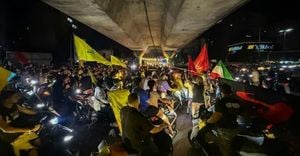Students at New York University (NYU) faced significant backlash following pro-Palestinian protests advocating for divestment from Israel, with at least eleven individuals suspended for one year. This response reflects the broader approach of the Trump administration toward educational institutions and protests, emphasizing strict adherence to rules and regulations.
According to Fox News, Cornell University professor William Jacobson commented on the situation, stating, "I think the key thing, and it seems to be going on at NYU, is not... schools come down hard on... students, it’s about enforcing the rules evenly." This statement emerged amid concerns over protests, where anti-Israel demonstrators were accused of prioritizing their agenda over the rules governing university life.
NYU's Faculty for Justice in Palestine (FJP) defended their actions, emphasizing their approach was part of nonviolent protests and claiming the university engaged in collective punishment by issuing lengthy suspensions. "Currently, at least eleven students have been suspended until January 2026," they posted on Instagram after the university's ruling.
The sit-in protests on December 11 and 12 involved distributing flyers and hanging banners on campus, which NYU characterized as harmful disruptions during finals week. John Beckman, NYU's spokesperson, asserted, “Rather, it was the intentional disruption of a library... This disruption was accompanied by threats of violence directed at senior members of the university community,” which leads to disciplinary measures.
Jacobson noted the possible influence of the Trump administration on such disciplinary actions, voicing hope for stringent enforcement of rules against creating hostile environments for students. He suggested the administration would treat these incidents according to rules without providing special privileges, highlighting concerns over the supposed targeting of pro-Israel students. "It's not your right to do [that]," he stressed.
At the heart of the issue lies the unprecedented rise of investigations targeting over 100 U.S. colleges and school districts for alleged antisemitism or Islamophobia, especially following the October 7 attack by Hamas. Federal civil rights investigations have reached various institutions, with several reaching settlements as the Biden administration sought to address these concerns. Rep. Tim Walberg of Michigan criticized these settlements as lacking teeth and urged the Trump administration to enforce real accountability.
President Trump has pledged to combat antisemitism vigorously, echoing sentiments previously voiced during his campaign. He declared colleges must eliminate antisemitic propaganda or risk losing accreditation and federal support. The potential for deportation of student protesters gained attention, with Trump stating to The Washington Post, “...they’re going to behave” upon hearing of these measures.
The executive order slated for signing aims to identify resources committed to combating antisemitism and includes significant stipulations for the deportation of immigrants found participating in pro-Palestinian protests. Aimed at deterring what the administration views as growing antisemitic sentiment on campuses, the order promises swift action against those involved with violent or threatening behaviors.”
Trump's ultimatum to resident aliens participating in protests was clear: “If you are involved with Hamas sympathies on college campuses, we will find you and deport you,” emphasizing his administration’s focus on stricter immigration enforcement.
Meanwhile, protests against immigration policies have characterized another front of activist response to the administration’s approach. Just days prior, demonstrators rallied against Trump’s immigration policies at the 101 Freeway near downtown Los Angeles. Draped with Mexican and Salvadoran flags, demonstrators managed to halt traffic and express their discontent with proposed deportation plans. Some protestors expressed how they found inspiration on social media, like TikTok, to mobilize support for their cause.
Attendees carried signs highlighting sentiments such as “No more I.C.E. raids, no more fear,” and chanted against aggressive deportation tactics. Although largely peaceful, the event highlighted underlying tensions as activists rallied against the administration’s efforts to eradicate undocumented immigration.
The scale of prior deportation threats loomed large over protest sites as Trump declared efforts to revamp the immigration system as “the largest deportation effort in U.S. history.” The disruptive rhetoric and mobilization quickly led to highway closures, as activists took action to voice their dissent and reclaim public spaces.
Tom Emmer, State Representative for Minnesota, emphasized the importance of resisting hostility toward immigrant populations. Advocates from various organizations argue against Trump's immigration stance, presenting safety and legal paths as integral components of current discussions.
Whether from college campuses or city streets, the fall-out from Trump’s policies continues to reflect deep societal divisions. Each protest, just as much as each administrative order, encapsulates the conflict inherent within the pursuit of justice and rights for different communities.



